Unit 1 Past and Present 单元综合复习课件(共74张PPT)
文档属性
| 名称 | Unit 1 Past and Present 单元综合复习课件(共74张PPT) | 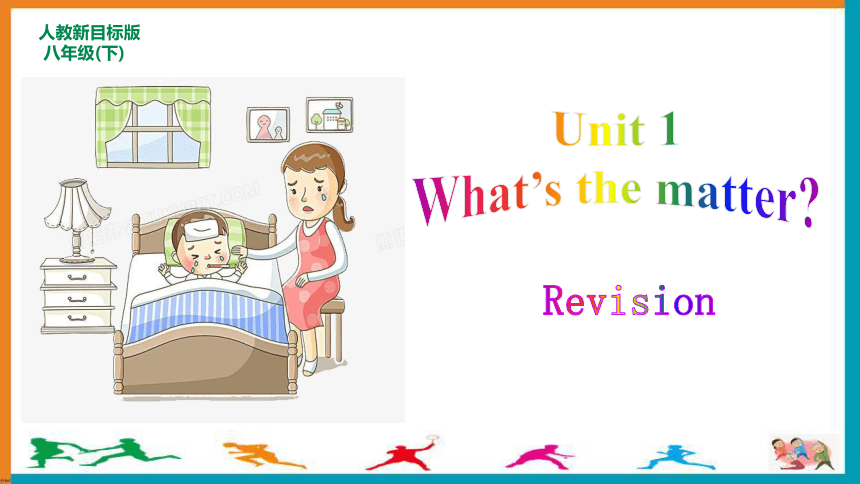 | |
| 格式 | pptx | ||
| 文件大小 | 2.4MB | ||
| 资源类型 | 教案 | ||
| 版本资源 | 牛津译林版 | ||
| 科目 | 英语 | ||
| 更新时间 | 2024-01-07 20:23:17 | ||
图片预览

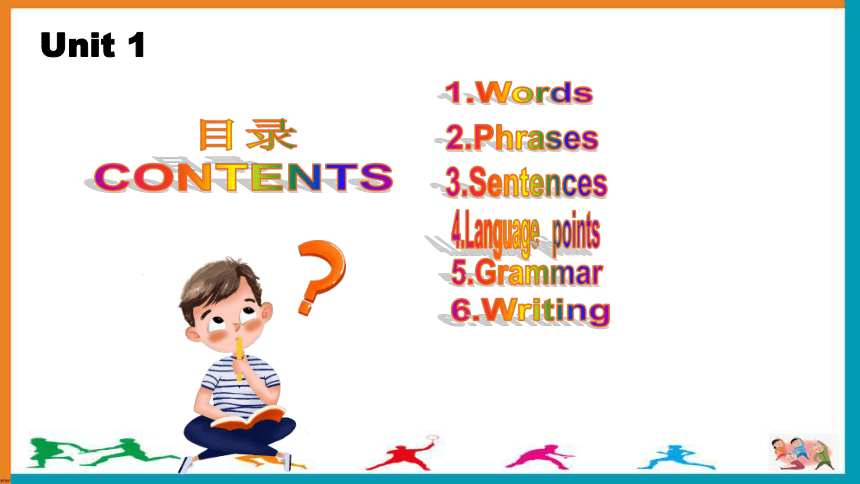
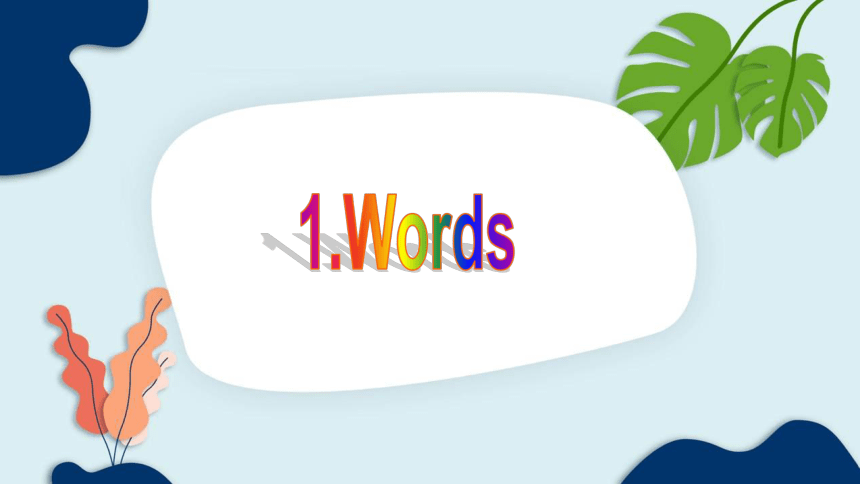
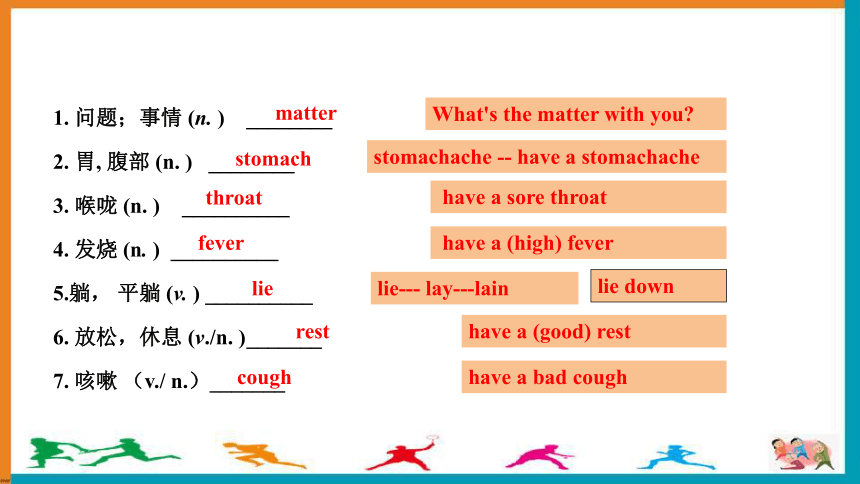
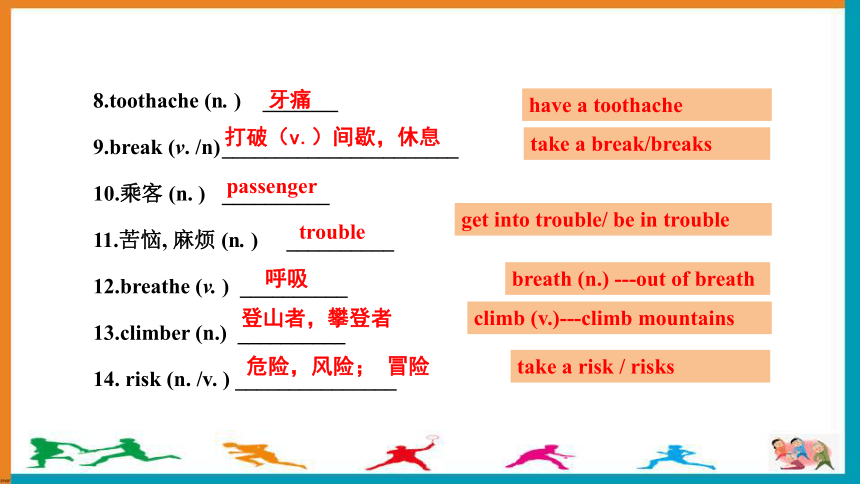
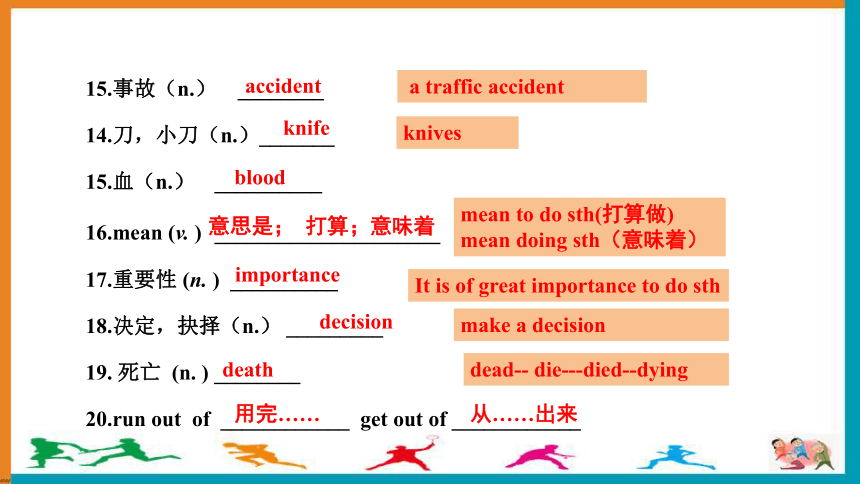
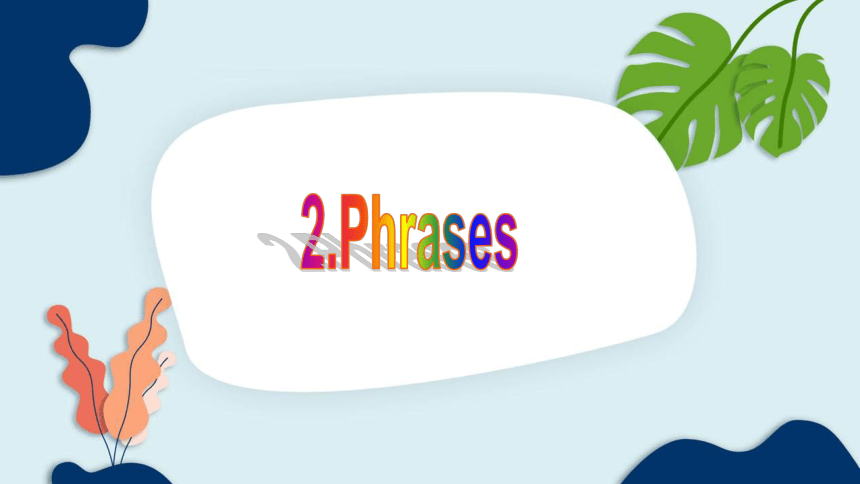
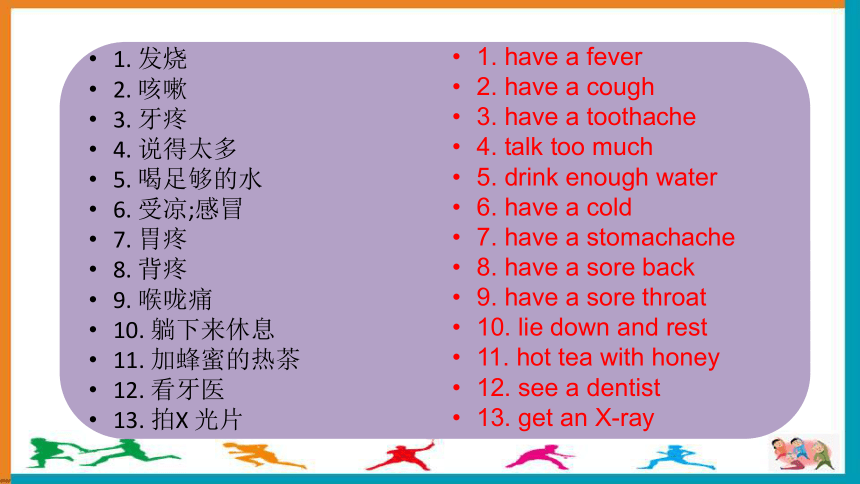
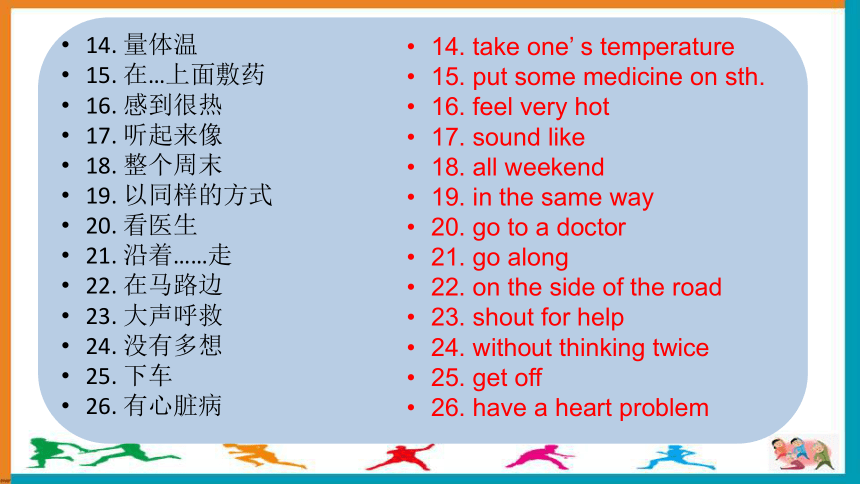
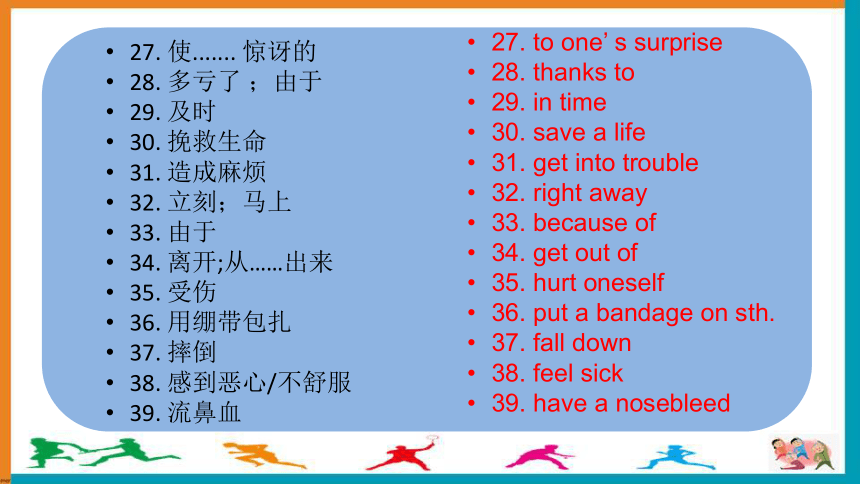
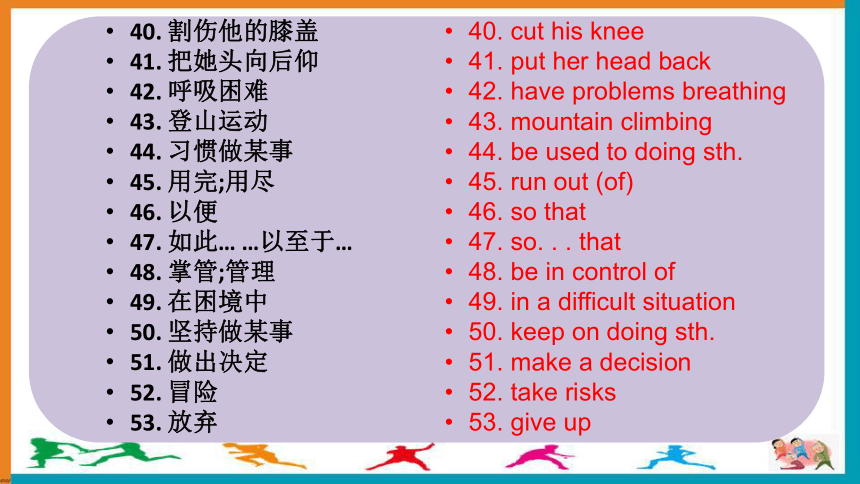
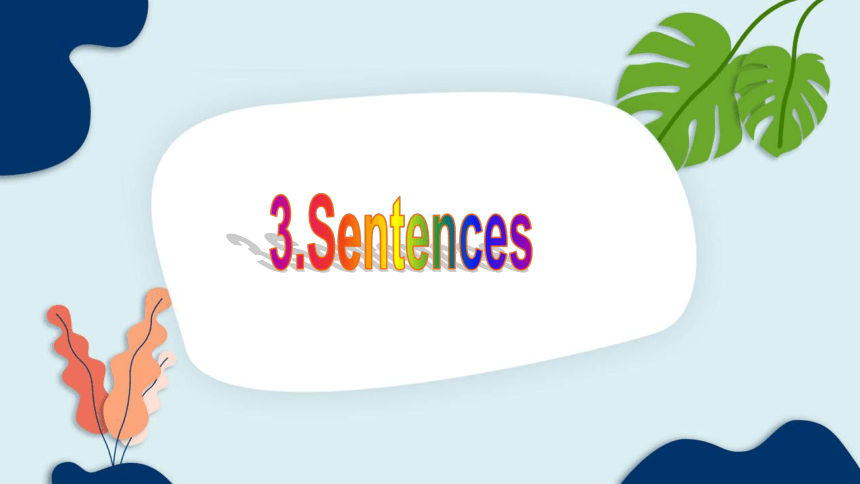
文档简介
(共74张PPT)
Unit 1
What’s the matter
人教新目标版
八年级(下)
Revision
目录
CONTENTS
2.Phrases
1.Words
5.Grammar
6.Writing
3.Sentences
Unit 1
4.Language points
Review
1.Words
1. 问题;事情 (n. ) ________
2. 胃, 腹部 (n. ) ________
3. 喉咙 (n. ) __________
4. 发烧 (n. ) __________
5.躺, 平躺 (v. ) __________
6. 放松,休息 (v./n. ) _______
7. 咳嗽 (v./ n.)_______
matter
stomach
throat
fever
lie
rest
lie down
What's the matter with you
stomachache -- have a stomachache
have a sore throat
have a (high) fever
lie--- lay---lain
have a (good) rest
cough
have a bad cough
8.toothache (n. ) _______
9.break (v. /n) ______________________
10.乘客 (n. ) __________
11.苦恼, 麻烦 (n. ) __________
12.breathe (v. ) __________
13.climber (n.) __________
14. risk (n. /v. ) _______________
牙痛
打破(v.)间歇,休息
passenger
呼吸
登山者,攀登者
have a toothache
take a break/breaks
trouble
get into trouble/ be in trouble
breath (n.) ---out of breath
climb (v.)---climb mountains
危险,风险; 冒险
take a risk / risks
15.事故(n.) ________
14.刀,小刀(n.)_______
15.血(n.) __________
16.mean (v. ) _____________________
17.重要性 (n. ) __________
18.决定,抉择(n.) _________
19. 死亡 (n. ) ________
20.run out of ____________ get out of ____________
accident
意思是; 打算;意味着
importance
decision
a traffic accident
knife
knives
blood
mean to do sth(打算做)
mean doing sth(意味着)
It is of great importance to do sth
make a decision
death
dead-- die---died--dying
用完……
从……出来
Review
2.Phrases
1. 发烧
2. 咳嗽
3. 牙疼
4. 说得太多
5. 喝足够的水
6. 受凉;感冒
7. 胃疼
8. 背疼
9. 喉咙痛
10. 躺下来休息
11. 加蜂蜜的热茶
12. 看牙医
13. 拍X 光片
1. have a fever
2. have a cough
3. have a toothache
4. talk too much
5. drink enough water
6. have a cold
7. have a stomachache
8. have a sore back
9. have a sore throat
10. lie down and rest
11. hot tea with honey
12. see a dentist
13. get an X-ray
14. 量体温
15. 在…上面敷药
16. 感到很热
17. 听起来像
18. 整个周末
19. 以同样的方式
20. 看医生
21. 沿着……走
22. 在马路边
23. 大声呼救
24. 没有多想
25. 下车
26. 有心脏病
14. take one’ s temperature
15. put some medicine on sth.
16. feel very hot
17. sound like
18. all weekend
19. in the same way
20. go to a doctor
21. go along
22. on the side of the road
23. shout for help
24. without thinking twice
25. get off
26. have a heart problem
27. 使....... 惊讶的
28. 多亏了 ;由于
29. 及时
30. 挽救生命
31. 造成麻烦
32. 立刻;马上
33. 由于
34. 离开;从……出来
35. 受伤
36. 用绷带包扎
37. 摔倒
38. 感到恶心/不舒服
39. 流鼻血
27. to one’ s surprise
28. thanks to
29. in time
30. save a life
31. get into trouble
32. right away
33. because of
34. get out of
35. hurt oneself
36. put a bandage on sth.
37. fall down
38. feel sick
39. have a nosebleed
40. 割伤他的膝盖
41. 把她头向后仰
42. 呼吸困难
43. 登山运动
44. 习惯做某事
45. 用完;用尽
46. 以便
47. 如此… …以至于…
48. 掌管;管理
49. 在困境中
50. 坚持做某事
51. 做出决定
52. 冒险
53. 放弃
40. cut his knee
41. put her head back
42. have problems breathing
43. mountain climbing
44. be used to doing sth.
45. run out (of)
46. so that
47. so. . . that
48. be in control of
49. in a difficult situation
50. keep on doing sth.
51. make a decision
52. take risks
53. give up
Review
3.Sentences
根据所给汉语意思把句子补充完整。
________________ 怎么了?
I have a ____________. 我胃疼。
You _________ eat so much next time. 你下次不该吃那么多。
What’s the matter
stomachache
shouldn’t
What’s the matter with Ben 本怎么了?
He ___________. He _____________. 他伤了自己。他背疼。
He should _______________. 他应该躺下休息。
has a sore back
lie down and rest
hurt himself
Do you ____________ 你发烧了吗?
Yes, I do. / No, I don’t. / I don’t know.
是的。/不,我没有。/ 我不知道。
Does he _______________ 他牙痛吗?
Yes, he does. 是的。
He should __________ and get an X-ray.
他应该去看牙医,做X光检查。
have a fever
have a toothache
see a dentist
_________________ 她应该怎么做?
She should take her temperature.
她应该量一下体温。
________ I put some medicine on it
我应该先用些药吗?
_____________. 是的,你应该。
_______________. 不,你不应该。
What should she do
Should
Yes, you should
No, you shouldn’t
1. 曼迪,你能帮我量一下我的体温吗?
Mandy, could you help me ____ ___ ___________
2. 你需要远离电视休息一下。
You need to _____ ______ ______ ______ the TV.
二、根据汉语意思完成句子,每空一词。
take my temperature
take breaks away from
3. 你应该躺下来休息。
You should _____ ______ and ______.
4. 他用同样的方法做了一个飞机模型。
He made a model plane ____ ____ _____ _____.
5. 这个小男孩上个星期感冒了。
The little boy ____________ ___ _____ last week.
lie down
rest
in the same way
had/got/caught a cold
6. 昨晚我们的牛奶用完了。
We _____ _____ _____ our milk last night.
7. 令我吃惊的是,他不肯与我们合作。
___ ___ _______, he refused to cooperate with us.
8. 没有人知道谁掌管着这家俱乐部。
Nobody knows who is ___ ______ ___ the club.
ran out of
To my surprise
in control of
9. 幸亏有了莉莉,我们才及时把爷爷送到了医院。
________ ____ Lily, we sent my grandpa to the
hospital in time.
10. 这不是冒险的时候,大家必须镇定。
This is not the time ____ _____ _____, everyone
must keep calm.
Thanks to
to take risks
1. 朱迪怎么了
2. 我该怎么办
3. 我应该量一下体温吗
4. 听起来你不像发烧。
5. 你需要离开电脑休息一下了。
6. 我觉得你应当躺下休息。
7. 如果明天你的头和脖子依旧痛的话,那就去看医生。
8. 他走下公交车,向这位女士了解发生了什么。
1. What's the matter with Judy
2. What should I do
3. Should I take my temperature
4. It doesn't sound like you have a fever.
5. You need to take breaks away from the computer.
6. I think you should lie down and rest.
7.If your head and neck still hurt tomorrow, then go to a doctor.
8. He got off and asked the woman what happened.
Review
4.Language points
1. What’s the matter
What’s the matter (with sb.) =What’s wrong (with sb.)
怎么了?用来询问疾病、事故伤害等。
What’s the matter 答语:
sb.+have / get / catch a(n)+疾病名称,表示患某种疾病。
如:I have / get / catch a cold.
sb.+be / feel +某些形容词,表示某人感到不适。如:
I am/feel sick.
身体部位+be / feel+某些形容词,表示某部位感到不适。如:My head is / feels hot.
身体部位+hurt,表示某部位痛。如:
My stomach hurts.
sb.+get+某些动词的过去分词形式,表示受伤。如:
He got sunburned (晒伤的) yesterday.
sb.+hurt / cut+具体部位/反身代词,表示伤害。如:
He hurt his arm in the accident.
I cut myself when cooking.
【拓展】用来询问疾病、不适或突发情况时:
What’s the trouble (with ...)
What happened (to ...)
Is there anything wrong (with ...)
2. I have a cold.
have a(n) + 疾病名称:表示患病。
常用词组还有:
have a bad cold 重感冒
have a fever 发烧
have a headache 头痛
have a stomachache 肚子痛, 胃痛
have a toothache 牙痛
3. lie down and rest
lie (lay) v. 躺;平躺 lie down 躺下
e.g. Don’t lie in the sun for too long.
【温馨提示】 lie的现在分词是lying
rest n. & v. 放松;休息
have a rest = take a rest = rest 休息
e.g. If you’re tired, we’ll stop and rest for a while.
Have a good rest and you will feel better.
4. If your head and neck still hurt tomorrow, then go to a doctor.
hurt vi. 感到疼痛,身体部位的疼痛。要用疼痛的具体部位作主语。
hurt vt. (使)疼痛;受伤;伤害。肉体上的伤害,和精神情感上的伤害。
hurt oneself 伤着了某人自己
hurt adj. 受伤的,可作定语和表语
e.g. Fortunately, no one was seriously hurt.
5... when the driver saw an old man lying on the side of the road.
……这时司机看到一位老人正躺在路边。
see sb. doing sth. 看见某人正在做某事
e.g. When I pass the window I see him drawing a picture.
see sb. do sth. 看见某人做过某事
e.g. I often see him draw pictures.
1) 我看见他时他正在河边玩。
I saw him _______ by the river.
2) 我看见过他在河边玩。
I saw him _______ by the river.
playing
play
【语境应用】完成句子。
3) 我看着他过了桥。
I see him _______ across the bridge.
4) 我看见她正在洗碗。
I see her _______ the dishes.
walk
washing
6. But to his surprise, they all agreed to go with him.
to one’s surprise 使......惊讶的是,出乎......意料
e.g. To their surprise, all the students pass the exam.
Much to everyone’s surprise, the plan succeeded.
【拓展】
in surprise 吃惊地
e.g. Rose looked at me in surprise.
7. It’s sad that many people don’t want to help others because they don’t want any trouble, ...
n. 问题;麻烦 (不可数);麻烦的事情 (可数)
trouble
get sb. into trouble 使某人陷入困境
be in trouble 有烦事、有困难
have trouble in doing sth. 做某事有困难
e.g. He never came except when he was in trouble.
If you do, you might get me into trouble.
Do you have much trouble in finding the house
【语境应用】完成句子。
1) 他认为每天吃饭是一件麻烦事。
He thinks that eating every day is ________________.
2) 你知道你现在为什么处于困境吗?
Do you know why you ____________________ now
3) 我妹妹在学习英语方面有困难。
My sister ____________________ English.
a trouble
are in trouble
has trouble in studying
8 有关疾病、伤害及救治的表达法
表示患病
have/get a(n)+疾病名称 (have更常见)
e.g. have a cold have a fever
have a cough get a stomachache
get a toothache
某些搭配中也使用catch,如catch a cold等。
表示不适
get+动词-ed
be/feel+形容词
be/feel tired be/feel sick
be/feel dizzy(晕头转向)
head feels hot
get hurt get cut in the hand
get hit by a ball
表示伤害
hurt/cut+反身代词
hurt/cut/break+身体具体部位
hurt my leg cut her finger
break his arm
hurt myself
cut himself
表达诊治:take/get…(take更常见)
take one’s temperature take some medicine
take an injection (注射)
take/get an X-ray
表达就医:see…/go to…
see the dentist/doctor go to a doctor
go to (the) hospital
9.Someone felt sick.
sick adj. 生病的;有病的
sick & ill
相同 生病的,都可作表语。
e.g. Alice was ill / sick yesterday.
不同 表“生病”时,sick可作定语,但ill不作定语。
e.g. Could you help the sick girl
【语境应用】根据句意用ill或sick填空。
1) The driver sent the ________ baby to the hospital.
2) My brother is ________. I have to look after him at home.
sick
ill/sick
10. As a mountain climber, Aron is used to taking risks.
be used to 习惯于…… to是介词,后接名词或动名词短语。
e.g. He is used to falling asleep (入睡) with such noises around him.
n. 风险
冒险
risk
take a risk/risks 冒险
take the risk of 冒着……的风险
at the risk of 冒着……的危险
risk one’s life 冒着生命危险
risk doing sth冒险做某事
v. 冒险
11. This means being in a difficult situation that you cannot seem to get out of.
v. 意思是;打算
mean doing sth. 意味着做某事
mean to do sth. 打算/意欲去做某事
mean
e.g. I didn’t mean to upset you. 我并不是要让你不高兴。
My new job will mean travelling all over the world.
我的新工作需要在世界各地到处跑。
【语境应用】完成句子。
1) Without more data (数据) we cannot make a(n) __________ (meaning) comparison (对比) of the two systems.
2) I’m sure there’s no hidden ________ (mean) in what he says.
meaningful
meaning
【拓展】
meaning n. 意思,意义
meaningful adj. 有意义的,意味深长的
meaningless adj. 没有意义的
12. Aron tells of the importance of making good decisions…
decide v. 决定
decide to do sth. 决定做某事
e.g. Tina decided to go to Rome for her holidays.
蒂娜决定去罗马度假。
【同根词】
decision n. 决定;抉择
make a decision / make one’s decision 做决定
e.g. She has had to make some very difficult decisions.
13. … and before we have to make a decision that could mean life or death.
death n. 死;死亡 (不可数名词)
【同根词】
die v. 死;死亡 (短暂性动词) 生命的结束,强调动作。dead adj. 死亡的;表示死亡时间要用延续性的 be dead。
dying adj. 要死的、濒临死亡的
dying也是die的v.-ing形式哦。
e.g.
The girl’s grandpa died five years ago.
I always feel very sad when thinking of my grandpa’s death.
The old man is dying.
The doctor tried to save the dying boy.
Her father has been dead for a year.
Review
4.Grammar
1.有关疾病、伤害及救治的表达法
表示患病
have/get a(n)+疾病名称 (have更常见)
e.g. have a cold have a fever
have a cough get a stomachache
get a toothache
某些搭配中也使用catch,如catch a cold等。
表示不适
get+动词-ed
be/feel+形容词
be/feel tired be/feel sick
be/feel dizzy(晕头转向)
head feels hot
get hurt get cut in the hand
get hit by a ball
表示伤害
hurt/cut+反身代词
hurt/cut/break+身体具体部位
hurt my leg cut her finger
break his arm
hurt myself
cut himself
表达诊治:take/get…(take更常见)
take one’s temperature take some medicine
take an injection (注射)
take/get an X-ray
表达就医:see…/go to…
see the dentist/doctor go to a doctor
go to (the) hospital
should modal v. (情态动词)后接动词原形, 没有人称和数的变化。用于提出建议劝告别人。
否定形式为should not, 缩写为shouldn’t。
1. — Tom, I have a toothache. 汤姆, 我牙痛。
— You should see a dentist. 你应当去看牙医。
2.should
2. — I’m not feeling well these days. I have bad cough.
这些天我身体不适, 老是咳嗽。
— You shouldn’t smoke so much, I think.
我认为你不该抽这么多烟。
3. — Should I put some medicine on it
— Yes, you should. / No, you shouldn’t.
4. — What should she do
— She should take her temperature.
含should的一般疑问句是将should提至主语前;
其简略回答:Yes, 主语(人称代词)+should.
No, 主语(人称代词)+shouldn’t.
-What should she ____
-She ______ take her temperature.
2) - I have a stomachache.
-You _________ eat so much next time.
3) -He hurt himself. He has a sore back.
-He ______ lie down and rest.
4) -He has a toothache.
-He __________ a dentist and get an X-ray.
5) -What ______ she do
-She ___________ her temperature.
6) - _______ I ____ some medicine on it
- Yes, you should. /No, you __________.
Fill in the blanks.
do
should
shouldn’t
should
go
Ready
should
should see
shouldn’t
Should put
should take
根据汉语意思完成下列句子。
1. 你应该按时完成作业。
You _______ ______ your homework
on time.
2. 你不应该相信陌生人。
You ________ _______ strangers.
3. 我应该打开窗户吗?
______ ____ ______ the window
should finish
shouldn’t believe
Should I open
反身代词又称为自身代词,表示动作行为反射到行为执行者本身。它还可以在句中起到强调的作用,用以加强语气。反身代词在使用时应注意和它所指的相应的对象在人称、性别、数上保持一致。
第一人称 第二人称 第三人称
单数 myself yourself himself
herself
itself
复数 ourselves yourselves themselves
1. 可用作宾语,指的是宾语和主语表示同一个或同一些的人或事物。
e.g. Maria bought herself a scarf. 玛丽亚给自己买了一条围巾。
We must look after ourselves very well.
我们必须好好照顾自己。
反身代词的用法:
2. 用作表语,指的是表语和主语表示同一个或同一些人或事物。
e.g. She isn’t quite herself today. 她今天身体不太舒服。
3. 可用作主语或宾语的同位语,常用来加强语气。
e.g. She herself will fly to London tomorrow.
明天她自己将要坐飞机去伦敦。
I met the writer himself last week.
我上周见到了那位作家本人。
4. 某些固定短语当中。
照顾自己 look after oneself / take care of oneself
自学 teach oneself sth./ learn sth. by oneself
玩得高兴,过得愉快 enjoy oneself
请自用……(随便吃/喝些……)help oneself to sth.
(all) by oneself 独自,单独 enjoy oneself 玩得高兴;过得愉快
for oneself 亲自;为自己 dress oneself 给自己穿衣服
help oneself to… 随便吃/用…… teach oneself 自学
lose oneself in 沉浸于 hurt oneself 伤着自己
含有反身代词的一些固定短语
反身代词表自身,句中用法可三分。
动介后面用作宾,表示动作回自身。
句中强调同位语,主语宾语后边跟。
巧学妙记
1. 反身代词不能单独做主语,但可以做主语的同位语,起强调作用。
如:我自己能完成作业。
I myself can finish my homework. / I can finish my homework myself.
【温馨提示】
2. 反身代词不能表示“某人的东西”,没有所有格的形式。
某人自己的(东西):one’s own
如:我用我自己的蜡笔画画。
I’m drawing with my own crayons.
We enjoyed _____ at the English party last weekend.
A. us B. our C. ours D. ourselves
D
2. Don’t ask what this country can do for you. Ask ________ what you can do for this country.
A. yourselves B. you C. themselves D. them
A
Review
5.Writing
本单元的话题是“健康和急救”。针对该话题,常见的考查角度是针对健康问题提出建议。体裁以记叙文、说明文为主,时态可能涉及一般现在时、一般过去时和一般将来时,多采用第二人称。行文中注意灵活运用表达建议的句型,避免句式单一。
以“健康与急救”为话题,要求学生能够描述病情并给出建议。在具体的写作中,学生应做到以下几点:
1.能够用英语描述疾病或事故发生的时间、地点和相关情况;
2.能够叙述处理问题的经过和结果;
3.能够使用should,had better等情态动词就如何保持健康提供相关的建议。
【典型例题2】
假如你是李华,你的美国笔友Lucy给你写信说她最近脖子疼。请你根据下面的要点提示,给Lucy回信提供一些建议,并希望她早日康复。
要点:1.分析她脖子疼的原因;
2.建议她不应该做什么;
3.建议她应该做什么。
【审题思路】
1.审人称:写信给对方提出建议,应以第二人称为主。
2.审时态:分析原因以一般过去时为主,给出建议以一般现在时为主。
3.注意事项:
( 1 )文章应逻辑合理,条理清晰;
( 2 )拓展的原因和建议应合理,符合实际。
【写作提纲】
1.开篇引出话题:I’m sorry to hear that you have a sore neck these days.
2.主体部分分析原因并提出建议:I’m afraid...You should...And you’d better...Besides...
3.结尾表达祝愿:I hope you’ll be well soon.
Dear Lucy,
I’m sorry to hear that you have a sore neck these days.I’m afraid you played computer games too much.It is harmful to sit in the same way for hours without doing any exercise.You should stop playing computer games.And you’d better take breaks when you work on the computer.Besides,exercise can help you build up your health.So try to exercise more often.
I hope you’ll be well soon.
Yours,
Li Hua
Review
6.Exercises
I. 单项选择
1. Did you do the homework ______
A. you B. yourself C. your D. yours
2. His name is James, but he usually calls ______ Jim.
A. he B. him C. his D. himself
3. —Your uncle is very good at cooking! How did he learn it
—He learned it by ______.
A. him B. himself C. her D. herself
B
D
B
4. Linda and Kitty will go to Greenery Theme Park by ______ next Sunday.
A. they B. them C. their D. themselves
5. —Did you enjoy ______ in Chengdu last week
—Yes, I had great fun there.
A. myself B. yourself C. ourselves D. themselves
D
B
用括号内所给单词的适当形式填空。
1.He shouldn't ________ (eat) in class.
2.Should I _________ (take) my temperature
3.The old man had problems breathing.What should we do
____________ (help) him
4.Watching TV __________ (it) isn't always bad for you, but too
much of it is not good.
5.“You are old enough, boy.You'd better do it___________(you),”
my father said to me.
eat
take
to help
itself
yourself
按要求完成下列句子。
11.Should I cut up the carrots?(作否定回答)
No, _________ _____________.
12.My father has a headache.(改为一般疑问句)
___________ your father _________ a headache
you
shouldn't
Does
have
13.Mrs.Hand's daughter has a stomachache.(对画线部分提问)
_________ _____ __________________ _______ Mrs.Hand's
daughter
14.Lisa should ask her parents for help.(对画线部分提问)
_________ _________ Lisa ________
What's
the
matter/trouble
with
What
should
do
根据括号内提示填空。
All of us want to keep healthy but few of us know how to keep healthy. Here is my advice.
First, (1)_______________________ (我们应该吃健康的食物) every day. Try not to eat junk food. As for teeth, (2)____________________________ (我们不应该吃太多的糖). If we eat too much, we’ll have a toothache.
Second, (3)__________________________ (我们应该进行足够的锻炼). My parents are good examples for me. They play sports every day in the park.
we should eat healthy food
we shouldn’t eat too much sugar
we should get enough exercise
They can breathe fresh air there. They are healthy. Sometimes they climb mountains and they enjoy (4)__________ (them).
Third, (5)_______________________ (我们必须有良好的睡眠). We should sleep at least eight hours every night. (6)______________________ (我们不应该熬夜). We should go to bed early and get up early. We should learn to look after (7)________ (our) well.
All in all, to keep healthy, I think it’s important to have a good living habit.
themselves
we must have a good sleep
We shouldn’t stay up late
ourselves
Review
直击中考
2.[2022四川雅安中考]—What’s the matter, Dad?
—I have a ______. I have to see a dentist.
A.fever B.headache C.toothache D.stomachache
C
3.[2021广西百色中考]I used to ______ at half past six, but now I am getting used to ______ at seven.
A.getting up; get up B.get up; getting up
C.got up; getting up D.got up; get up
B
1.[2022黑龙江鸡西中考]—Jack, will your family move to Shanghai?
—Yes. My parents have made the ______.
A.problem B.challenge C.decision
C
4.[2022贵州黔东南州中考]An old man ______ on the side of the road was found ______, and he was sent to the hospital by the bus driver and passengers immediately.
A.lies; dies B.lay; died
C.lain; dead D.lying; dying
D
6.[2022江苏常州中考]To make our dream come true, we ______ rest on what we have done.
A.may not B.should not
C.need not D.could not
B
5.[2021广西贵港中考]—My grandma is used to ______ in the countryside.
—Oh. So is my grandma.
A.live B.lives C.living D.lived
C
Thank you !
Unit 1
What’s the matter
人教新目标版
八年级(下)
Revision
目录
CONTENTS
2.Phrases
1.Words
5.Grammar
6.Writing
3.Sentences
Unit 1
4.Language points
Review
1.Words
1. 问题;事情 (n. ) ________
2. 胃, 腹部 (n. ) ________
3. 喉咙 (n. ) __________
4. 发烧 (n. ) __________
5.躺, 平躺 (v. ) __________
6. 放松,休息 (v./n. ) _______
7. 咳嗽 (v./ n.)_______
matter
stomach
throat
fever
lie
rest
lie down
What's the matter with you
stomachache -- have a stomachache
have a sore throat
have a (high) fever
lie--- lay---lain
have a (good) rest
cough
have a bad cough
8.toothache (n. ) _______
9.break (v. /n) ______________________
10.乘客 (n. ) __________
11.苦恼, 麻烦 (n. ) __________
12.breathe (v. ) __________
13.climber (n.) __________
14. risk (n. /v. ) _______________
牙痛
打破(v.)间歇,休息
passenger
呼吸
登山者,攀登者
have a toothache
take a break/breaks
trouble
get into trouble/ be in trouble
breath (n.) ---out of breath
climb (v.)---climb mountains
危险,风险; 冒险
take a risk / risks
15.事故(n.) ________
14.刀,小刀(n.)_______
15.血(n.) __________
16.mean (v. ) _____________________
17.重要性 (n. ) __________
18.决定,抉择(n.) _________
19. 死亡 (n. ) ________
20.run out of ____________ get out of ____________
accident
意思是; 打算;意味着
importance
decision
a traffic accident
knife
knives
blood
mean to do sth(打算做)
mean doing sth(意味着)
It is of great importance to do sth
make a decision
death
dead-- die---died--dying
用完……
从……出来
Review
2.Phrases
1. 发烧
2. 咳嗽
3. 牙疼
4. 说得太多
5. 喝足够的水
6. 受凉;感冒
7. 胃疼
8. 背疼
9. 喉咙痛
10. 躺下来休息
11. 加蜂蜜的热茶
12. 看牙医
13. 拍X 光片
1. have a fever
2. have a cough
3. have a toothache
4. talk too much
5. drink enough water
6. have a cold
7. have a stomachache
8. have a sore back
9. have a sore throat
10. lie down and rest
11. hot tea with honey
12. see a dentist
13. get an X-ray
14. 量体温
15. 在…上面敷药
16. 感到很热
17. 听起来像
18. 整个周末
19. 以同样的方式
20. 看医生
21. 沿着……走
22. 在马路边
23. 大声呼救
24. 没有多想
25. 下车
26. 有心脏病
14. take one’ s temperature
15. put some medicine on sth.
16. feel very hot
17. sound like
18. all weekend
19. in the same way
20. go to a doctor
21. go along
22. on the side of the road
23. shout for help
24. without thinking twice
25. get off
26. have a heart problem
27. 使....... 惊讶的
28. 多亏了 ;由于
29. 及时
30. 挽救生命
31. 造成麻烦
32. 立刻;马上
33. 由于
34. 离开;从……出来
35. 受伤
36. 用绷带包扎
37. 摔倒
38. 感到恶心/不舒服
39. 流鼻血
27. to one’ s surprise
28. thanks to
29. in time
30. save a life
31. get into trouble
32. right away
33. because of
34. get out of
35. hurt oneself
36. put a bandage on sth.
37. fall down
38. feel sick
39. have a nosebleed
40. 割伤他的膝盖
41. 把她头向后仰
42. 呼吸困难
43. 登山运动
44. 习惯做某事
45. 用完;用尽
46. 以便
47. 如此… …以至于…
48. 掌管;管理
49. 在困境中
50. 坚持做某事
51. 做出决定
52. 冒险
53. 放弃
40. cut his knee
41. put her head back
42. have problems breathing
43. mountain climbing
44. be used to doing sth.
45. run out (of)
46. so that
47. so. . . that
48. be in control of
49. in a difficult situation
50. keep on doing sth.
51. make a decision
52. take risks
53. give up
Review
3.Sentences
根据所给汉语意思把句子补充完整。
________________ 怎么了?
I have a ____________. 我胃疼。
You _________ eat so much next time. 你下次不该吃那么多。
What’s the matter
stomachache
shouldn’t
What’s the matter with Ben 本怎么了?
He ___________. He _____________. 他伤了自己。他背疼。
He should _______________. 他应该躺下休息。
has a sore back
lie down and rest
hurt himself
Do you ____________ 你发烧了吗?
Yes, I do. / No, I don’t. / I don’t know.
是的。/不,我没有。/ 我不知道。
Does he _______________ 他牙痛吗?
Yes, he does. 是的。
He should __________ and get an X-ray.
他应该去看牙医,做X光检查。
have a fever
have a toothache
see a dentist
_________________ 她应该怎么做?
She should take her temperature.
她应该量一下体温。
________ I put some medicine on it
我应该先用些药吗?
_____________. 是的,你应该。
_______________. 不,你不应该。
What should she do
Should
Yes, you should
No, you shouldn’t
1. 曼迪,你能帮我量一下我的体温吗?
Mandy, could you help me ____ ___ ___________
2. 你需要远离电视休息一下。
You need to _____ ______ ______ ______ the TV.
二、根据汉语意思完成句子,每空一词。
take my temperature
take breaks away from
3. 你应该躺下来休息。
You should _____ ______ and ______.
4. 他用同样的方法做了一个飞机模型。
He made a model plane ____ ____ _____ _____.
5. 这个小男孩上个星期感冒了。
The little boy ____________ ___ _____ last week.
lie down
rest
in the same way
had/got/caught a cold
6. 昨晚我们的牛奶用完了。
We _____ _____ _____ our milk last night.
7. 令我吃惊的是,他不肯与我们合作。
___ ___ _______, he refused to cooperate with us.
8. 没有人知道谁掌管着这家俱乐部。
Nobody knows who is ___ ______ ___ the club.
ran out of
To my surprise
in control of
9. 幸亏有了莉莉,我们才及时把爷爷送到了医院。
________ ____ Lily, we sent my grandpa to the
hospital in time.
10. 这不是冒险的时候,大家必须镇定。
This is not the time ____ _____ _____, everyone
must keep calm.
Thanks to
to take risks
1. 朱迪怎么了
2. 我该怎么办
3. 我应该量一下体温吗
4. 听起来你不像发烧。
5. 你需要离开电脑休息一下了。
6. 我觉得你应当躺下休息。
7. 如果明天你的头和脖子依旧痛的话,那就去看医生。
8. 他走下公交车,向这位女士了解发生了什么。
1. What's the matter with Judy
2. What should I do
3. Should I take my temperature
4. It doesn't sound like you have a fever.
5. You need to take breaks away from the computer.
6. I think you should lie down and rest.
7.If your head and neck still hurt tomorrow, then go to a doctor.
8. He got off and asked the woman what happened.
Review
4.Language points
1. What’s the matter
What’s the matter (with sb.) =What’s wrong (with sb.)
怎么了?用来询问疾病、事故伤害等。
What’s the matter 答语:
sb.+have / get / catch a(n)+疾病名称,表示患某种疾病。
如:I have / get / catch a cold.
sb.+be / feel +某些形容词,表示某人感到不适。如:
I am/feel sick.
身体部位+be / feel+某些形容词,表示某部位感到不适。如:My head is / feels hot.
身体部位+hurt,表示某部位痛。如:
My stomach hurts.
sb.+get+某些动词的过去分词形式,表示受伤。如:
He got sunburned (晒伤的) yesterday.
sb.+hurt / cut+具体部位/反身代词,表示伤害。如:
He hurt his arm in the accident.
I cut myself when cooking.
【拓展】用来询问疾病、不适或突发情况时:
What’s the trouble (with ...)
What happened (to ...)
Is there anything wrong (with ...)
2. I have a cold.
have a(n) + 疾病名称:表示患病。
常用词组还有:
have a bad cold 重感冒
have a fever 发烧
have a headache 头痛
have a stomachache 肚子痛, 胃痛
have a toothache 牙痛
3. lie down and rest
lie (lay) v. 躺;平躺 lie down 躺下
e.g. Don’t lie in the sun for too long.
【温馨提示】 lie的现在分词是lying
rest n. & v. 放松;休息
have a rest = take a rest = rest 休息
e.g. If you’re tired, we’ll stop and rest for a while.
Have a good rest and you will feel better.
4. If your head and neck still hurt tomorrow, then go to a doctor.
hurt vi. 感到疼痛,身体部位的疼痛。要用疼痛的具体部位作主语。
hurt vt. (使)疼痛;受伤;伤害。肉体上的伤害,和精神情感上的伤害。
hurt oneself 伤着了某人自己
hurt adj. 受伤的,可作定语和表语
e.g. Fortunately, no one was seriously hurt.
5... when the driver saw an old man lying on the side of the road.
……这时司机看到一位老人正躺在路边。
see sb. doing sth. 看见某人正在做某事
e.g. When I pass the window I see him drawing a picture.
see sb. do sth. 看见某人做过某事
e.g. I often see him draw pictures.
1) 我看见他时他正在河边玩。
I saw him _______ by the river.
2) 我看见过他在河边玩。
I saw him _______ by the river.
playing
play
【语境应用】完成句子。
3) 我看着他过了桥。
I see him _______ across the bridge.
4) 我看见她正在洗碗。
I see her _______ the dishes.
walk
washing
6. But to his surprise, they all agreed to go with him.
to one’s surprise 使......惊讶的是,出乎......意料
e.g. To their surprise, all the students pass the exam.
Much to everyone’s surprise, the plan succeeded.
【拓展】
in surprise 吃惊地
e.g. Rose looked at me in surprise.
7. It’s sad that many people don’t want to help others because they don’t want any trouble, ...
n. 问题;麻烦 (不可数);麻烦的事情 (可数)
trouble
get sb. into trouble 使某人陷入困境
be in trouble 有烦事、有困难
have trouble in doing sth. 做某事有困难
e.g. He never came except when he was in trouble.
If you do, you might get me into trouble.
Do you have much trouble in finding the house
【语境应用】完成句子。
1) 他认为每天吃饭是一件麻烦事。
He thinks that eating every day is ________________.
2) 你知道你现在为什么处于困境吗?
Do you know why you ____________________ now
3) 我妹妹在学习英语方面有困难。
My sister ____________________ English.
a trouble
are in trouble
has trouble in studying
8 有关疾病、伤害及救治的表达法
表示患病
have/get a(n)+疾病名称 (have更常见)
e.g. have a cold have a fever
have a cough get a stomachache
get a toothache
某些搭配中也使用catch,如catch a cold等。
表示不适
get+动词-ed
be/feel+形容词
be/feel tired be/feel sick
be/feel dizzy(晕头转向)
head feels hot
get hurt get cut in the hand
get hit by a ball
表示伤害
hurt/cut+反身代词
hurt/cut/break+身体具体部位
hurt my leg cut her finger
break his arm
hurt myself
cut himself
表达诊治:take/get…(take更常见)
take one’s temperature take some medicine
take an injection (注射)
take/get an X-ray
表达就医:see…/go to…
see the dentist/doctor go to a doctor
go to (the) hospital
9.Someone felt sick.
sick adj. 生病的;有病的
sick & ill
相同 生病的,都可作表语。
e.g. Alice was ill / sick yesterday.
不同 表“生病”时,sick可作定语,但ill不作定语。
e.g. Could you help the sick girl
【语境应用】根据句意用ill或sick填空。
1) The driver sent the ________ baby to the hospital.
2) My brother is ________. I have to look after him at home.
sick
ill/sick
10. As a mountain climber, Aron is used to taking risks.
be used to 习惯于…… to是介词,后接名词或动名词短语。
e.g. He is used to falling asleep (入睡) with such noises around him.
n. 风险
冒险
risk
take a risk/risks 冒险
take the risk of 冒着……的风险
at the risk of 冒着……的危险
risk one’s life 冒着生命危险
risk doing sth冒险做某事
v. 冒险
11. This means being in a difficult situation that you cannot seem to get out of.
v. 意思是;打算
mean doing sth. 意味着做某事
mean to do sth. 打算/意欲去做某事
mean
e.g. I didn’t mean to upset you. 我并不是要让你不高兴。
My new job will mean travelling all over the world.
我的新工作需要在世界各地到处跑。
【语境应用】完成句子。
1) Without more data (数据) we cannot make a(n) __________ (meaning) comparison (对比) of the two systems.
2) I’m sure there’s no hidden ________ (mean) in what he says.
meaningful
meaning
【拓展】
meaning n. 意思,意义
meaningful adj. 有意义的,意味深长的
meaningless adj. 没有意义的
12. Aron tells of the importance of making good decisions…
decide v. 决定
decide to do sth. 决定做某事
e.g. Tina decided to go to Rome for her holidays.
蒂娜决定去罗马度假。
【同根词】
decision n. 决定;抉择
make a decision / make one’s decision 做决定
e.g. She has had to make some very difficult decisions.
13. … and before we have to make a decision that could mean life or death.
death n. 死;死亡 (不可数名词)
【同根词】
die v. 死;死亡 (短暂性动词) 生命的结束,强调动作。dead adj. 死亡的;表示死亡时间要用延续性的 be dead。
dying adj. 要死的、濒临死亡的
dying也是die的v.-ing形式哦。
e.g.
The girl’s grandpa died five years ago.
I always feel very sad when thinking of my grandpa’s death.
The old man is dying.
The doctor tried to save the dying boy.
Her father has been dead for a year.
Review
4.Grammar
1.有关疾病、伤害及救治的表达法
表示患病
have/get a(n)+疾病名称 (have更常见)
e.g. have a cold have a fever
have a cough get a stomachache
get a toothache
某些搭配中也使用catch,如catch a cold等。
表示不适
get+动词-ed
be/feel+形容词
be/feel tired be/feel sick
be/feel dizzy(晕头转向)
head feels hot
get hurt get cut in the hand
get hit by a ball
表示伤害
hurt/cut+反身代词
hurt/cut/break+身体具体部位
hurt my leg cut her finger
break his arm
hurt myself
cut himself
表达诊治:take/get…(take更常见)
take one’s temperature take some medicine
take an injection (注射)
take/get an X-ray
表达就医:see…/go to…
see the dentist/doctor go to a doctor
go to (the) hospital
should modal v. (情态动词)后接动词原形, 没有人称和数的变化。用于提出建议劝告别人。
否定形式为should not, 缩写为shouldn’t。
1. — Tom, I have a toothache. 汤姆, 我牙痛。
— You should see a dentist. 你应当去看牙医。
2.should
2. — I’m not feeling well these days. I have bad cough.
这些天我身体不适, 老是咳嗽。
— You shouldn’t smoke so much, I think.
我认为你不该抽这么多烟。
3. — Should I put some medicine on it
— Yes, you should. / No, you shouldn’t.
4. — What should she do
— She should take her temperature.
含should的一般疑问句是将should提至主语前;
其简略回答:Yes, 主语(人称代词)+should.
No, 主语(人称代词)+shouldn’t.
-What should she ____
-She ______ take her temperature.
2) - I have a stomachache.
-You _________ eat so much next time.
3) -He hurt himself. He has a sore back.
-He ______ lie down and rest.
4) -He has a toothache.
-He __________ a dentist and get an X-ray.
5) -What ______ she do
-She ___________ her temperature.
6) - _______ I ____ some medicine on it
- Yes, you should. /No, you __________.
Fill in the blanks.
do
should
shouldn’t
should
go
Ready
should
should see
shouldn’t
Should put
should take
根据汉语意思完成下列句子。
1. 你应该按时完成作业。
You _______ ______ your homework
on time.
2. 你不应该相信陌生人。
You ________ _______ strangers.
3. 我应该打开窗户吗?
______ ____ ______ the window
should finish
shouldn’t believe
Should I open
反身代词又称为自身代词,表示动作行为反射到行为执行者本身。它还可以在句中起到强调的作用,用以加强语气。反身代词在使用时应注意和它所指的相应的对象在人称、性别、数上保持一致。
第一人称 第二人称 第三人称
单数 myself yourself himself
herself
itself
复数 ourselves yourselves themselves
1. 可用作宾语,指的是宾语和主语表示同一个或同一些的人或事物。
e.g. Maria bought herself a scarf. 玛丽亚给自己买了一条围巾。
We must look after ourselves very well.
我们必须好好照顾自己。
反身代词的用法:
2. 用作表语,指的是表语和主语表示同一个或同一些人或事物。
e.g. She isn’t quite herself today. 她今天身体不太舒服。
3. 可用作主语或宾语的同位语,常用来加强语气。
e.g. She herself will fly to London tomorrow.
明天她自己将要坐飞机去伦敦。
I met the writer himself last week.
我上周见到了那位作家本人。
4. 某些固定短语当中。
照顾自己 look after oneself / take care of oneself
自学 teach oneself sth./ learn sth. by oneself
玩得高兴,过得愉快 enjoy oneself
请自用……(随便吃/喝些……)help oneself to sth.
(all) by oneself 独自,单独 enjoy oneself 玩得高兴;过得愉快
for oneself 亲自;为自己 dress oneself 给自己穿衣服
help oneself to… 随便吃/用…… teach oneself 自学
lose oneself in 沉浸于 hurt oneself 伤着自己
含有反身代词的一些固定短语
反身代词表自身,句中用法可三分。
动介后面用作宾,表示动作回自身。
句中强调同位语,主语宾语后边跟。
巧学妙记
1. 反身代词不能单独做主语,但可以做主语的同位语,起强调作用。
如:我自己能完成作业。
I myself can finish my homework. / I can finish my homework myself.
【温馨提示】
2. 反身代词不能表示“某人的东西”,没有所有格的形式。
某人自己的(东西):one’s own
如:我用我自己的蜡笔画画。
I’m drawing with my own crayons.
We enjoyed _____ at the English party last weekend.
A. us B. our C. ours D. ourselves
D
2. Don’t ask what this country can do for you. Ask ________ what you can do for this country.
A. yourselves B. you C. themselves D. them
A
Review
5.Writing
本单元的话题是“健康和急救”。针对该话题,常见的考查角度是针对健康问题提出建议。体裁以记叙文、说明文为主,时态可能涉及一般现在时、一般过去时和一般将来时,多采用第二人称。行文中注意灵活运用表达建议的句型,避免句式单一。
以“健康与急救”为话题,要求学生能够描述病情并给出建议。在具体的写作中,学生应做到以下几点:
1.能够用英语描述疾病或事故发生的时间、地点和相关情况;
2.能够叙述处理问题的经过和结果;
3.能够使用should,had better等情态动词就如何保持健康提供相关的建议。
【典型例题2】
假如你是李华,你的美国笔友Lucy给你写信说她最近脖子疼。请你根据下面的要点提示,给Lucy回信提供一些建议,并希望她早日康复。
要点:1.分析她脖子疼的原因;
2.建议她不应该做什么;
3.建议她应该做什么。
【审题思路】
1.审人称:写信给对方提出建议,应以第二人称为主。
2.审时态:分析原因以一般过去时为主,给出建议以一般现在时为主。
3.注意事项:
( 1 )文章应逻辑合理,条理清晰;
( 2 )拓展的原因和建议应合理,符合实际。
【写作提纲】
1.开篇引出话题:I’m sorry to hear that you have a sore neck these days.
2.主体部分分析原因并提出建议:I’m afraid...You should...And you’d better...Besides...
3.结尾表达祝愿:I hope you’ll be well soon.
Dear Lucy,
I’m sorry to hear that you have a sore neck these days.I’m afraid you played computer games too much.It is harmful to sit in the same way for hours without doing any exercise.You should stop playing computer games.And you’d better take breaks when you work on the computer.Besides,exercise can help you build up your health.So try to exercise more often.
I hope you’ll be well soon.
Yours,
Li Hua
Review
6.Exercises
I. 单项选择
1. Did you do the homework ______
A. you B. yourself C. your D. yours
2. His name is James, but he usually calls ______ Jim.
A. he B. him C. his D. himself
3. —Your uncle is very good at cooking! How did he learn it
—He learned it by ______.
A. him B. himself C. her D. herself
B
D
B
4. Linda and Kitty will go to Greenery Theme Park by ______ next Sunday.
A. they B. them C. their D. themselves
5. —Did you enjoy ______ in Chengdu last week
—Yes, I had great fun there.
A. myself B. yourself C. ourselves D. themselves
D
B
用括号内所给单词的适当形式填空。
1.He shouldn't ________ (eat) in class.
2.Should I _________ (take) my temperature
3.The old man had problems breathing.What should we do
____________ (help) him
4.Watching TV __________ (it) isn't always bad for you, but too
much of it is not good.
5.“You are old enough, boy.You'd better do it___________(you),”
my father said to me.
eat
take
to help
itself
yourself
按要求完成下列句子。
11.Should I cut up the carrots?(作否定回答)
No, _________ _____________.
12.My father has a headache.(改为一般疑问句)
___________ your father _________ a headache
you
shouldn't
Does
have
13.Mrs.Hand's daughter has a stomachache.(对画线部分提问)
_________ _____ __________________ _______ Mrs.Hand's
daughter
14.Lisa should ask her parents for help.(对画线部分提问)
_________ _________ Lisa ________
What's
the
matter/trouble
with
What
should
do
根据括号内提示填空。
All of us want to keep healthy but few of us know how to keep healthy. Here is my advice.
First, (1)_______________________ (我们应该吃健康的食物) every day. Try not to eat junk food. As for teeth, (2)____________________________ (我们不应该吃太多的糖). If we eat too much, we’ll have a toothache.
Second, (3)__________________________ (我们应该进行足够的锻炼). My parents are good examples for me. They play sports every day in the park.
we should eat healthy food
we shouldn’t eat too much sugar
we should get enough exercise
They can breathe fresh air there. They are healthy. Sometimes they climb mountains and they enjoy (4)__________ (them).
Third, (5)_______________________ (我们必须有良好的睡眠). We should sleep at least eight hours every night. (6)______________________ (我们不应该熬夜). We should go to bed early and get up early. We should learn to look after (7)________ (our) well.
All in all, to keep healthy, I think it’s important to have a good living habit.
themselves
we must have a good sleep
We shouldn’t stay up late
ourselves
Review
直击中考
2.[2022四川雅安中考]—What’s the matter, Dad?
—I have a ______. I have to see a dentist.
A.fever B.headache C.toothache D.stomachache
C
3.[2021广西百色中考]I used to ______ at half past six, but now I am getting used to ______ at seven.
A.getting up; get up B.get up; getting up
C.got up; getting up D.got up; get up
B
1.[2022黑龙江鸡西中考]—Jack, will your family move to Shanghai?
—Yes. My parents have made the ______.
A.problem B.challenge C.decision
C
4.[2022贵州黔东南州中考]An old man ______ on the side of the road was found ______, and he was sent to the hospital by the bus driver and passengers immediately.
A.lies; dies B.lay; died
C.lain; dead D.lying; dying
D
6.[2022江苏常州中考]To make our dream come true, we ______ rest on what we have done.
A.may not B.should not
C.need not D.could not
B
5.[2021广西贵港中考]—My grandma is used to ______ in the countryside.
—Oh. So is my grandma.
A.live B.lives C.living D.lived
C
Thank you !
